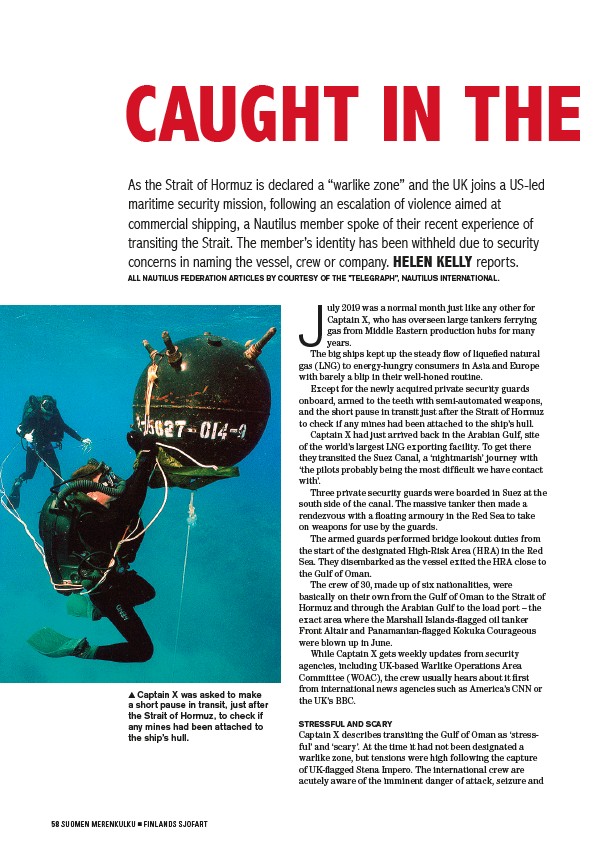
CAUGHT IN THE As the Strait of Hormuz is declared a “warlike zone” and the UK joins a US-led
maritime security mission, following an escalation of violence aimed at
commercial shipping, a Nautilus member spoke of their recent experience of
transiting the Strait. The member’s identity has been withheld due to security
concerns in naming the vessel, crew or company. HELEN KELLY reports.
ALL NAUTILUS FEDERATION ARTICLES BY COURTESY OF THE ”TELEGRAPH”, NAUTILUS INTERNATIONAL.
58 SUOMEN MERENKULKU J FINLANDS SJÖFART
July 2019 was a normal month just like any other for
Captain X, who has overseen large tankers ferrying
gas from Middle Eastern production hubs for many
years.
The big ships kept up the steady flow of liquefied natural
gas (LNG) to energy-hungry consumers in Asia and Europe
with barely a blip in their well-honed routine.
Except for the newly acquired private security guards
onboard, armed to the teeth with semi-automated weapons,
and the short pause in transit just after the Strait of Hormuz
to check if any mines had been attached to the ship’s hull.
Captain X had just arrived back in the Arabian Gulf, site
of the world’s largest LNG exporting facility. To get there
they transited the Suez Canal, a ‘nightmarish’ journey with
‘the pilots probably being the most difficult we have contact
with’.
Three private security guards were boarded in Suez at the
south side of the canal. The massive tanker then made a
rendezvous with a floating armoury in the Red Sea to take
on weapons for use by the guards.
The armed guards performed bridge lookout duties from
the start of the designated High-Risk Area (HRA) in the Red
Sea. They disembarked as the vessel exited the HRA close to
the Gulf of Oman.
The crew of 30, made up of six nationalities, were
basically on their own from the Gulf of Oman to the Strait of
Hormuz and through the Arabian Gulf to the load port – the
exact area where the Marshall Islands-flagged oil tanker
Front Altair and Panamanian-flagged Kokuka Courageous
were blown up in June.
While Captain X gets weekly updates from security
agencies, including UK-based Warlike Operations Area
Committee (WOAC), the crew usually hears about it first
from international news agencies such as America’s CNN or
the UK’s BBC.
STRESSFUL AND SCARY
Captain X describes transiting the Gulf of Oman as ‘stress-ful’
and ‘scary’. At the time it had not been designated a
warlike zone, but tensions were high following the capture
of UK-flagged Stena Impero. The international crew are
acutely aware of the imminent danger of attack, seizure and
G Captain X was asked to make
a short pause in transit, just after
the Strait of Hormuz, to check if
any mines had been attached to
the ship’s hull.